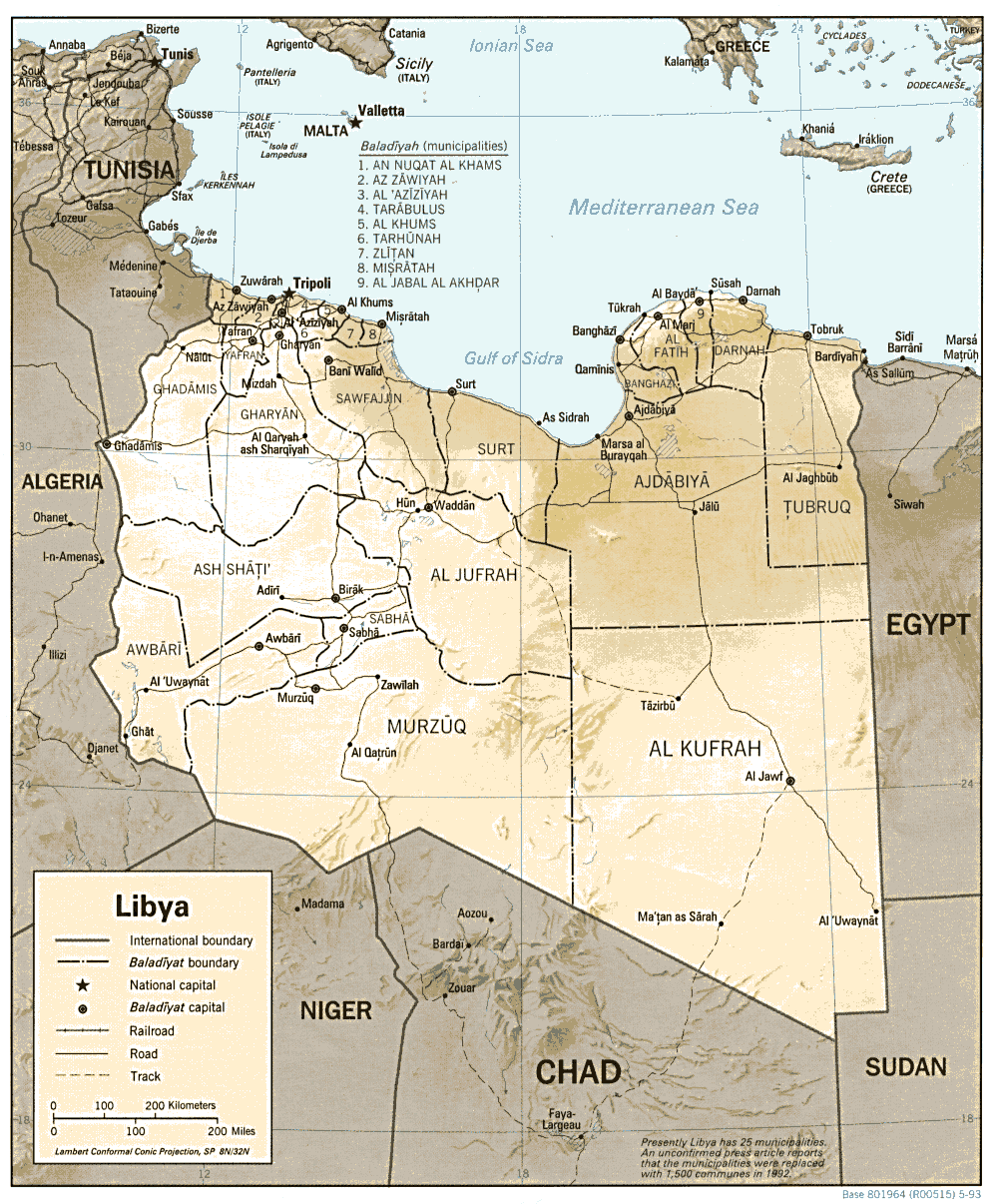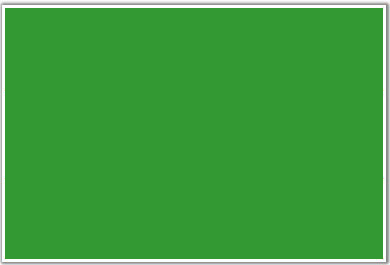
Image taken from:
"MyTravelGuide."2005,http://www.mytravelguide.com/travel-tools/maps/North-Africa-map.php.

Image taken from:
"TangertTours."2008, http://www.tangertours.com.ly/aboutlibya/aboutlibya.html.

Image taken from:
"Bubl."2007, http://bubl.ac.uk/LINK/types/maps.htm.
History:
In ancient times, portions of Libya were controlled by many different ancient civilizations. The Phoenicians were known to have resided in eastern Libya and trade with other civilizations in the area that controlled parts of the land (Lost Civiliazations). The western part of Libya was controlled first by the Carthaginians and then taken under control of the Roman Empire in 46 BC (Infoplease). The eastern portion was named Cyrenaica and the western part of Libya was called Tripolitania. Tripolitania was held under the control of the Roman Empire until 436 AD in which it was taken over by the Vandals. Cyrenaica was taken from the Carthaginians in the 1 BC by the Roman Empire until 642 AD when the Arabs gained control of the land (Pearson Education).
In the 16th century all of Libya was taken under control of the Ottoman Empire and remained under there control until it was again invaded in 1911 by Italy (US Dept. of State). In 1934, the area was officially known was Libya, a name meaning in Greek “North Africa,” an Italian colony (US Dept of State). Before the occupation of Libya, King Idris, emir of Cyrenaica, was creating financial grants from Italy and making a parliament for Cyrenaica. When he found out about Italy invaded, he fled to Egypt to live in exile. While in exile he led revolts in between both world wars against the occupation of Italy (US Dept of State). Idris returned from exile in 1947 after the Allied peace treaty demolished all control of Libya for Italy. In 1949, the United Nations passed a resolution demanding that Libya become an independent country before January 1, 1952. King Idris responded to this and Libya declared its independence on December 24, 1951. Libya was the first country to gain independence because of the United Nations and was also the first African colony to gain independence (US Dept of State). King Idris created Libya to be a monarchy with him in power.
Later in 1959, Libya discovered it had a great amount of oil within its territory, fueling the economy of the country. Unfortunately, this made a small percentage of the population wealthy and leaving the larger majority of the country still impoverished (US Dept of State). September 1, 1969, Colonel Mu’ammar Abu Minyar al-Qadhafi and a small group of army men overthrew King Ildris and exiled him to Egypt. Qadhafi took out the monarchy of the government and placed instead the Libyan Arab Republic, with himself as chief of state (US Dept of State).
In the 1980’s Libya held close ties with the Soviet Union and raised tensions between the United States and Libya. After a bombing on a Pan Am flight over Scotland in 1988, the UN sanctioned Libya demanding that Qadhafi surrender the suspects of the bombing. Qadhafi finally surrendered the two men in suspect in 1999 and began to follow the other demands so that sanctions could be lifted by the UN. This finally happened in 2003, leading to Qadhafi beginning to abandon his projects for weapons of mass destruction (US Dept of State).
Sources:
Infoplease. "Libya: History, Geography, Government, and Culture." Infoplease. 2007. 26 Dec. 2008 http://www.infoplease.com/ipa/A0107722.html.
“Lost Civilizations.” 2007, http://www.lost-civilizations.net/phoenicians-history.html.
Politics:
Before Libya became independent, it was a colony of Italy, which at the time was a fascist government. After Libya independence in 1951, Kind Ildris created Libya to be a monarchy with himself in control. In the later 50’s oil was discovered in Libya making a handful of people very wealthy and the rest of the population to still live poorly. Although the discovery of oil in their country did change the country from being one of the poorest in the world to one of the richest in the middle east. A small group of military men led by Colonel Qadhafi overthrew King Ildris and made the country into a Libyan Arab Republic. To this day Qadhafi is still the chief of state for the country. Interestingly enough, he does not have an official position in Libya. The only thing Qadhafi is titled in official government papers is “Brother Leader and Guide of the Revolution.”
Qadhafi has the government structured around Islamic and socialist theories. This structure gives Colonel Qadhafi almost complete power over any governmental decision. There is a structured legislative branch to compliment Qadhafi, in which the members are from scattered ministries throughout Libya. The legislative branch is within the General People’s Congress, which is created for the public to have a say in decisions. There are also 3 court systems in place, the courts of first instance, the court of appeals and the Supreme Court, the judges for the Supreme Court are appointed by the General People’s Congress.
Unfortunately, Qadhafi seems to run the country almost in fear and suspicion of his people attempting to overthrow him. In the 1980’s there was an attempted military coup on Qadhafi led by exiles, in response to this, Qadhafi had thousands imprisoned and interrogated. He attempted to find the leaders of the coup which brought more dissatisfaction about the Libyan government. He later loosened his control on the country and released some of the prisoners as well as allowed his citizens to travel easier. At the same time he began watching anti-Islamic groups believing that they were the ones conspiring these coups. Qadhafi would strike these groups in suspicion to keep himself safe.
Economically, oil is the largest export, and basically only, of Libya and amounts to about 97% of Libya’s export profits. Libya is one of the highest per individual gross domestic product countries in Afrcia, but unfortunately because of bad management by the government, the country still suffers from high inflation and high import prices. Libya imports almost all of its food consumed and this has been increasing because of rising populations. All of this has led to a fall in the in standard of living for the citizens of Libya. In 2004, President George Bush ended the sanction with Libya allowing Americans to work in Libya and since then American companies have began looking at Libya as an option for investments. Libya’s government has announced recently that they plan to begin many infrastructure projects.
Source used:
United States Department of State. “Libya.” October 2007, http://www.state.gov/r/pa/ei/bgn/5425.htm.
